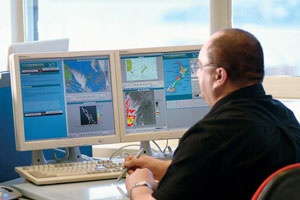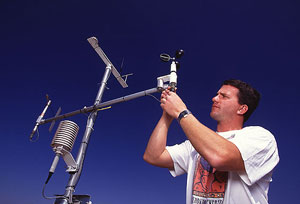Meteorologist
Tasks & duties

Meteorologists may do some or all of the following:
-
use scientific methods to interpret global, regional and local weather information from radar and satellites, weather stations, islands, ships and aircraft, meteorological balloons and drifting buoys
-
work out and predict the weather conditions on land and sea, based on their study of this information
-
prepare weather maps for television and newspapers
-
write forecasts for newspapers, radio, television, shipping and airline companies
-
study past and present weather and season patterns
-
carry out research into weather forecasting
-
develop new computer programs for weather forecasting
-
be involved in public awareness programmes about the weather
-
supervise the work of technical officers
Skills & knowledge

Meteorologists need to have:
-
knowledge of atmospheric physics and maths to understand weather, cloud patterns, and past and present climates
-
knowledge of what affects the weather in the regions they are forecasting
-
research skills
-
skill in analysing and interpreting research results and other information
-
practical skills for performing experiments and operating scientific equipment
-
problem-solving skills
-
planning and organisational skills
-
communication skills
-
writing skills, for writing reports and for publications
-
maths and computer skills
Entry requirements
To become a meteorologist you need to have a Bachelor of Science degree in maths or physics; although, an Honours or Masters degree in maths or physics is preferred.
Secondary education
A tertiary entrance qualification in maths with statistics and/or calculus, physics and English are recommended.
Tertiary education
A Bachelor of Science in maths or physics is required; although, an Honours or Masters degree in maths or physics is preferred. As part of the Meteorological Service of New Zealand Limited (MetService) weather forecasters' training programme, graduate meteorologists usually study for a one-year Post Graduate Diploma in Meteorology at Victoria University.
Training on the job
Graduate meteorologists employed by the MetService are supervised and trained for two years by senior meteorologists. Meteorologists must keep up to date with developments in the field through research and attendance at seminars, courses and conferences. The Internet and knowledge sharing among colleagues are also important sources of information.
Useful experience
Any experience or interest in the mathematical or physical sciences may be useful for meteorologists. Anyone involved in an outdoor sport or hobby (such as surfers, sailors, trampers or mountain climbers) requiring weather observation skills may also be suited to this work. As most meteorologists are required to do shift work, previous experience of shift work may be valuable.
Related courses
Atmospheric Sciences
Geophysics
Mathematics
For more information, please refer to Career Services.
Document Actions
